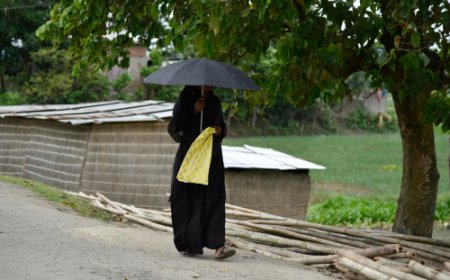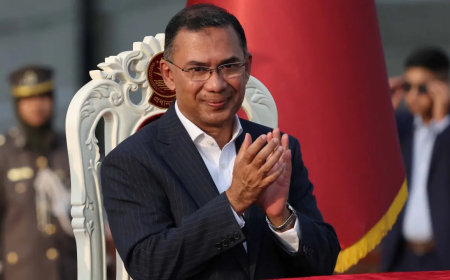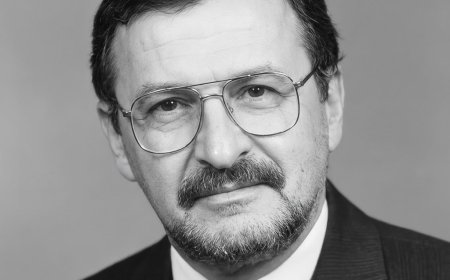How Rich Are Our Princes?
Neither Tarique Rahman nor Sajeeb Wazed Joy can claim moral leadership without embracing financial transparency. They owe the public answers not because they are accused men, but because they are influential men. They owe the public honesty because they seek to shape the future of Bangladesh.

There are moments in history when a nation is forced to confront not only the failures of its political class but also the collective unwillingness of its citizens to demand accountability from those who claim a right to lead. Bangladesh now stands at precisely such a moment.
The fall of the Awami League government in 2024 and the subsequent unmasking of long-suppressed political tensions have made one truth impossible to ignore: our two unofficial princes -- and I use the term with full sarcasm -- Tarique Rahman and Sajeeb Wazed Joy, have lived for decades above the level of scrutiny that ordinary Bangladeshis endure as a matter of survival.
Before moving forward, I ask readers to pause and recall the warnings our elders left for us in the decades after Partition and the early years of the republic. The editorials of the 1950s and 1960s pleaded with the public to reject dynasties, to reject the centralization of political power within families, and to resist any attempt -- whether in the name of democracy, liberation, or stability -- to elevate individuals above institutions.
Those voices understood something essential: a republic cannot thrive if its citizens accept hereditary claimants to leadership without demanding transparency, accountability, and equality before the law. Yet in Bangladesh, generation after generation, we have allowed political families to dominate our national life, and we have accepted opaque financial arrangements as inevitable side effects of their authority.
Today, the cost of that silence is fully visible.
Tarique Rahman has lived in London for nearly two decades, often described by his supporters as the symbolic head of the BNP and by others as a fugitive who benefited from the protection of foreign soil. Court cases against him have come and gone -- some deeply flawed, some perhaps politically motivated, and many marred by irregularities. Yet the central issues remain unresolved. Tarique has never offered a thorough, independent, publicly accessible accounting of how he financed his lifestyle, his legal expenses, his travels, his political communications, or his family’s needs during those long years abroad.
For someone who claims to be the rightful political heir to a major national party, such omissions cannot be brushed aside. It is entirely reasonable to ask who paid his rent in one of the world’s most expensive cities. Who covered his grocery bills, medical bills, and transportation? Who financed his daughter’s education? Who arranged the security measures he required? Who paid for the political operations he allegedly coordinated from afar?
These are not accusations. These are questions that any democratic society has the moral right to pose to an individual who aspires to return to national leadership. If his finances are clean, then full disclosure will only strengthen his credibility. If they are not, the public deserves to know before he seeks to influence the future of the country.
These questions should be asked even more urgently now that Dr. Muhammad Yunus -- after decades of being the establishment’s conscience appears to be taking a political short cut by striking a deal with the very prince who is currently, and only temporarily, in an advantageous position. The Nobel laureate may believe this is a pragmatic path to stability, but political bargains made with dynastic elites rarely produce democratic accountability.
They merely prolong the culture of impunity. Bangladesh cannot continue to be governed through backstage understandings between unelected power brokers and hereditary claimants to influence. If Dr. Yunus chooses expediency over transparency, it only strengthens the argument that all sides of our political spectrum are built on the same opaque foundations.
The same expectation must apply to Sajeeb Wazed Joy, whose political aura has long been wrapped in a narrative of Western education, technological expertise, and the promise of a “Digital Bangladesh.” Yet a polished résumé cannot substitute for transparency. Joy, too, has lived abroad for extended periods, financed a political presence that stretched across continents, and held influence far beyond any formal role.
Allegations surrounding his own finances have been persistent: questions about lobbying expenditures, questions about the sources of funds behind his US lifestyle, questions about real estate holdings, questions arising from corruption investigations tied to the Rooppur Nuclear Plant and land allocations, and questions about the monetization of national ID data. Whether these allegations are baseless or credible cannot be determined without something Bangladesh has never received from him: a complete, audited, public accounting of his financial life.
And so, the same questions must be asked of him. Who paid his rent? Who paid for his groceries and daily living expenses during the years he split his time between Dhaka and the United States? Who covered his children’s education, his medical care, his travel, his security, and his political initiatives? Who financed his lobbying efforts in Washington? Who paid for the network of consultants, advisors, and media strategists he relied upon? These are ordinary questions asked in every functioning democracy when public figures hold authority.
The extraordinary thing is that Bangladesh, a nation of 170 million citizens, has rarely asked them with any seriousness of its most powerful families.
Some will say that these questions are politically charged or that raising them risks destabilizing an already fragile political climate. But silence is the true destabilizer. Silence has nurtured corruption. Silence has enabled impunity. Silence has hollowed out the institutions that should protect citizens from the excesses of their rulers. Silence has reduced politics to inheritance, ideology to convenience, and public service to personal enrichment.
If Bangladesh is to chart a different path, it must begin by holding its most privileged sons to the same standards required of those who stand in passport queues, who submit loan documents, who gather receipts for income verification, who file tax returns, and who produce paperwork to prove their eligibility for the simplest government services.
Neither Tarique Rahman nor Sajeeb Wazed Joy can claim moral leadership without embracing financial transparency. They owe the public answers not because they are accused men, but because they are influential men. They owe the public clarity not because they are victims of political conspiracies, but because they have benefited from political dynasties.
They owe the public honesty not because of their fathers’ legacies or their mothers’ histories, but because they seek to shape the future of Bangladesh.
If they believe they have nothing to hide, then this is their opportunity to prove it. If they refuse, then the public must draw its own conclusions. I worked in Banani, Dhaka from 2006 to 2010. I have seen the line of bribe givers in front of the infamous Hawa Bhaban every day while walking by.
On the other hand when Sajeeb Wazed Joy's mother Sheikh Hasina was in power, I was a member of the National Curriculum Committee and saw first-hand the corruption in the textbook printing.
So I call upon both of them to come clean.
Omar Shehab is a theoretical quantum computer scientist at the IBM T. J. Watson Research Center, New York. His work has been supported by several agencies including the Department of Defense, Department of Energy, and NASA in the United States. He also regularly invests in the area of AI, deep tech, hard tech, and national security. He is also an alumnus of the Shahjalal University of Science and Technology.
What's Your Reaction?















































































